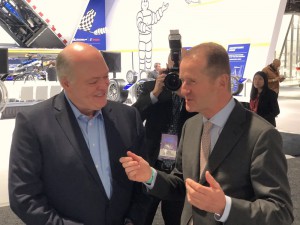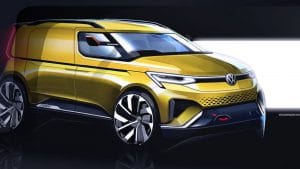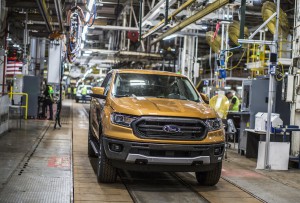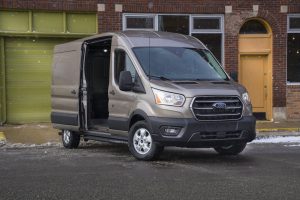
Ford and Volkswagen continue to grow their partnership, announcing plans to develop and sell 8 million new vehicles.
This story has been updated with additional information.
Ford Motor Co. and Volkswagen AG are moving forward on the next stage of their partnership, developing midsize pickups and commercial vans, targeting sales of 8 million units.
The pair will work to develop two vans and a pickup truck, according to Ford. In addition, the two makers will further their joint efforts on electric vehicles with Ford developing a new EV for Europe using VW’s Modular Electric Drive toolkit.
The new vehicle is slated to be ready by 2023 with a volume of more than 600,000 units and will “expand” Ford’s zero-emissions capabilities in Europe.
(VW signs $2.6B deal with Argo AI, Joins Ford with vehicle development.)
The van and pickup projects are expected to be one of the most extensive of these efforts, at least in the near-term, with three different products in the pipeline:
- A compact city van to be built by VW and then marketed by both manufacturers;
- A 1-ton cargo van in which Ford will play lead;
- And a version of the global Ford Ranger pickup that VW will market under its own badge, starting in 2022.
“This collaboration will efficiently drive down development costs, allowing broader global distribution of electric and commercial vehicles, and enhance the positions of both companies,” said Herbert Diess, the CEO of the Volkswagen Group, said on Wednesday.
Diess served as brand boss at VW when the alliance was announced in January 2019. He relinquished that title early this week under pressure from the carmaker’s Supervisory Board, but he will remain head of the Volkswagen Group, an umbrella that also covers brands ranging from entry-level Seat to high-line marques Audi, Bentley and Lamborghini.
For now, the van and pickup program is targeted at Europe and other global markets but not the United States. There has been talk about the possibility of VW entering the U.S. pickup segment, possibly using the American version of the Ranger. So far, however, the partners have said nothing is in the works.
The moves make plenty of sense, building on strengths each automaker already possesses. Ford and Volkswagen both have strong commercial van and pickup businesses around the world, including popular models such as Ford’s Transit and Ranger and Volkswagen Commercial Vehicle’s Transporter, Crafter, Caddy and Amarok, the companies noted.
“Commercial vehicles are fundamental to Ford today and an area where we will accelerate and grow and working with Volkswagen on these platforms will provide both of us significant financial advantages in things like engineering, and plants and tooling,” said Jim Farley, Ford chief operating officer, in a statement.
“Separately, Ford will add battery electric versions of Transit and F-150 in the next 24 months for commercial customers who increasingly need zero emissions and the power of connectivity, data and artificial intelligence.”
(Ford, VW open to further collaboration — and more partners.)
The relationship between Volkswagen and Ford goes back decades. One-time Ford Chairman Henry Ford II actually turned down a chance to buy the battered German automaker at the end of World War II. In the decades that followed, they found common ground on several occasions, among other things forming the AutoLatina joint venture in Brazil and Argentina that lasted into the mid-1990s.
Since 2018, the two manufacturers have moved to establish broader and deeper ties. Months after announcing the van and pickup program Ford said it would turn to VW for a platform it could use to produce battery-electric vehicles for the European market. At least two such BEVs, based on VW’s MEB architecture, are now in the works at Ford. The first will reach market in 2023 and Ford eventually expects to sell as many as 600,000 of those battery-electric vehicles.
For its part, the German carmaker plans to base dozens of models on that platform, including the ID.3 now on sale in Europe, as well as the ID.4 which will become its first long-range BEV in the U.S. market.
The two companies took the opportunity to clarify their relationship in Argo AI, in which Volkswagen closed a $2.6 billion investment deal last week. Ford already held a significant stake in the Pittsburgh-based venture to produce self-driving vehicles.

Late last year, Volkswagen released some teaser sketches for its 2020 Caddy city van. Could it be the blueprint for the next Ford Transit Connect?
The automakers “will both work with Argo AI to form distinct, highly capable autonomous-vehicle businesses based on Argo AI’s self-driving technology,” Ford noted in a release Wednesday, adding that each company independently chose to invest in the company.
“We have left the door open to further cooperation,” Ford CEO Jim Hackett told TheDetroitBureau.com in an exclusive conversation. He added, however, that, “We haven’t kicked anything off yet.” But industry sources believe they may look at opportunities that could include joint purchasing, as well as marketing and even manufacturing.
Separately, Ford officials expect its U.S. operations to be up and running at nearly 100% of capacity next month. The company restarted operations May 18 and has had a few problems since the restart that have required temporary shutdown of production lines at four plants.
“By July 6, we will expect to have all of our U.S. plants operating at pre-COVID patterns,” Chief Operating Officer Jim Farley said on a webcast of a presentation at a Deutsche Bank auto conference.
(Ford and VW Formally Unveil “Collaboration” on Electric and Autonomous Vehicles.)
During the period since the restart, the automaker has produced about 96% of its planned volume, Farley noted. Ford will begin adding back a third shift of work at many of its plants starting July 8.
(Paul Eisenstein contributed to this report.)



Checkers vs. chess.